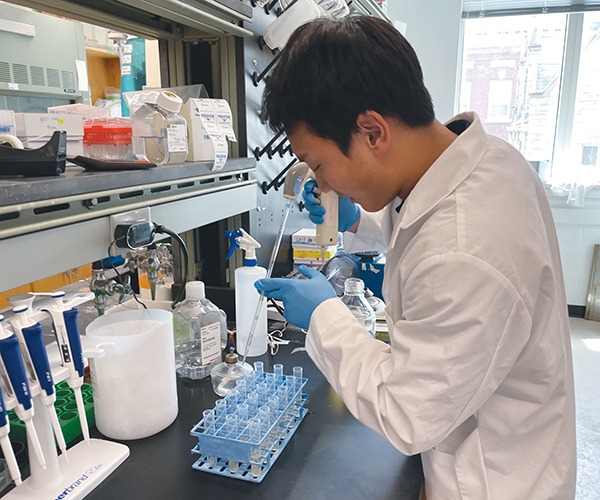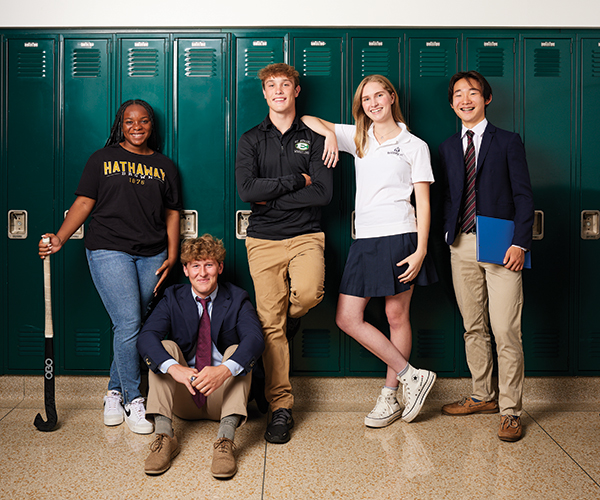What It Feels Like ... to Build Houses on a Mission Trip
Jacalyn Everhart, Senior, Padua Franciscan High School
Seventeen-year-old Everhart had her eyes on mission trips before she started high school. In fact, the programs offered by Padua swayed her choice in schools. The senior recently completed her first mission trip to the Dominican Republic and plans to return next year.
Mission trips are something I've always felt I should do. The main thing we did in the Dominican Republic was painting and priming houses in a new community. We also dug trenches for five foundations to be built there.
It was wonderful to work with the group that went down. We were singing songs while we were doing it, even though our arms got sore after a while. We even got to see one of the families move into a house. It was so rewarding to see all of our hard work pay off. We also helped run a baseball and English-speaking camp for kids in an older community. The first day we got there, they took us over in the backs of trucks — those were our taxis, that was so cool — and we got out and a big wall of kids came running toward us. They grabbed our hands. It didn't seem real to me that a little kid who had never met me would want to hold my hand and walk with me. They don't know who you are, but they still love you. — as told to Elisabeth Geisse
What It Feels Like ... to Serve as a Pallbearer for Someone in Need
Jack Eckman, Senior, St. Ignatius High School
Service is an integral part of student life at St. Ignatius, says Eckman, one of the school's 450 volunteer pallbearers. As a part of the school's St. Joseph of Arimathea Pallbearer Society, Eckman and his peers assist in laying to rest individuals whose families need extra help carrying out funeral ceremonies.
First we go to the chapel and do a little prayer service to get us into the mindset of what we're doing. Then we go to the Mass, where we're encouraged to be very active in our participation. We always give the families our condolences before we take the casket back out to the car.
It's kind of shocking that you're carrying a person to their grave. That sense of sadness comes over you as you're praying. When you look out at the church, there's not too many people there. So it's important that you're there for this person, even if you didn't know them.
The thing that sticks with me is the gratitude of the spouse of the deceased. They're just so grateful for us. It surprises me how people can be so kind.
On our way back to school, the teachers give us reflection sheets with two assignments: to describe what you are feeling and write a little prayer for the family. That's probably my favorite part about being a pallbearer. — as told to Elisabeth Geisse
What It Feels Like ... to Have your Play Performed on a Professional Stage
Aaron Davis, Senior, Benedictine High School
Davis submitted his 15-page play The Humanities Are Dead to the 36th annual Marilyn Bianchi Kids' Playwriting Festival on a whim — and could hardly believe when he won. The Benedictine senior received his prize in June: an entire weekend spent watching his play being performed at Dobama Theatre.
It was sort of surreal watching my play performed. The main character was a thinly veiled portrayal of me. So it was weird watching myself on the stage, saying these things I've said and hearing other characters say things that my friends have said.
The stage was modern, minimalistic. The bleachers created an amphitheater effect. The opening show was nearly sold out, and the audience really seemed to like it. That was probably the coolest thing about it being performed — seeing how people reacted, what real people thought of what I wrote. I wanted to gauge which jokes landed with people and what didn't.
At the end, the creative director of Dobama gave me his card and said he wanted me to write more and send it to him. Now I have expanded the play, so I'm very excited about that.
To see how many people are interested in the arts and in what people have to say is encouraging, because when you're interested in the humanities as a teenager, people tend to discourage it and insist there's no work in the field. This experience showed me the opposite, that the humanities aren't dead. — as told to Elisabeth Geisse
What It Feels Like ... to Set a World Record for Child Cancer Research
Matt Orbany, Senior, St. Edward High School
When Matt Orbany's brother, Michael, was diagnosed with cancer, Matt shaved his own head in solidarity. This March, he got more than 400 of his St. Edward peers, teachers and administrators to do the same, breaking the world record for most heads shaved in 60 minutes, while raising more than $10,000 for child cancer research.
The whole event lasted one hour. We were in our school's gym: On one side sat kids who didn't want to shave their heads, and on the other side were all those who wanted to shave. It cost $10 to get your head shaved, and then students had to raise a certain amount of money for each teacher to shave his head. One teacher, his head and beard went for $5,000.
It was chilling to see my classmates come together as brothers in unity and to donate their personal appearances for this cause. The mood in the gym was almost electric. We had a running tally of heads shaved on the scoreboard, and one teacher, a funny guy, on the mic emceeing.
My mom and my brother were there. She made a speech, and there was not one dry eye. It meant something to my brother — that we're in this fight with you. We're all behind each other and if somebody's in trouble, we're going to be with him.
This was the best choice of my life. This coming year, the event will be a memorial for my brother on the day that he passed. And when I go to college, I want to carry on my brother's legacy. — as told to Elisabeth Geisse




